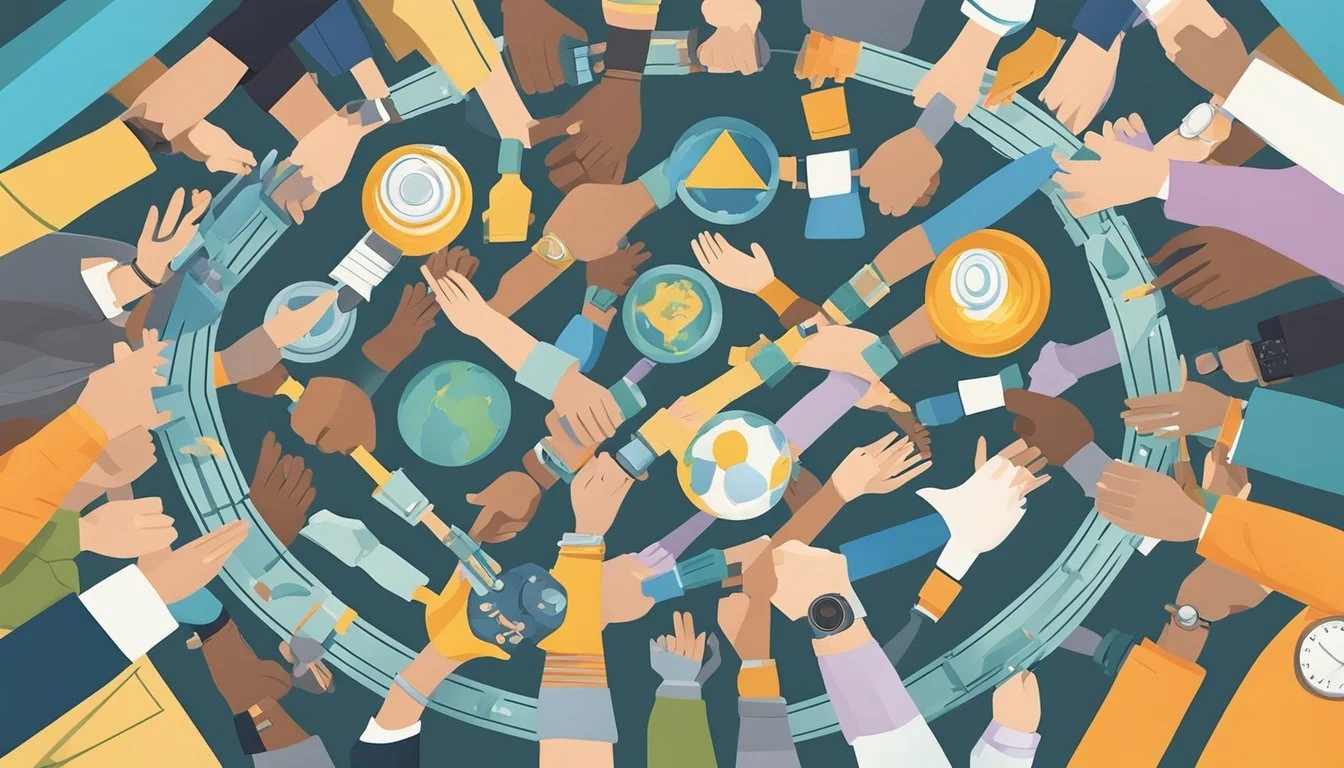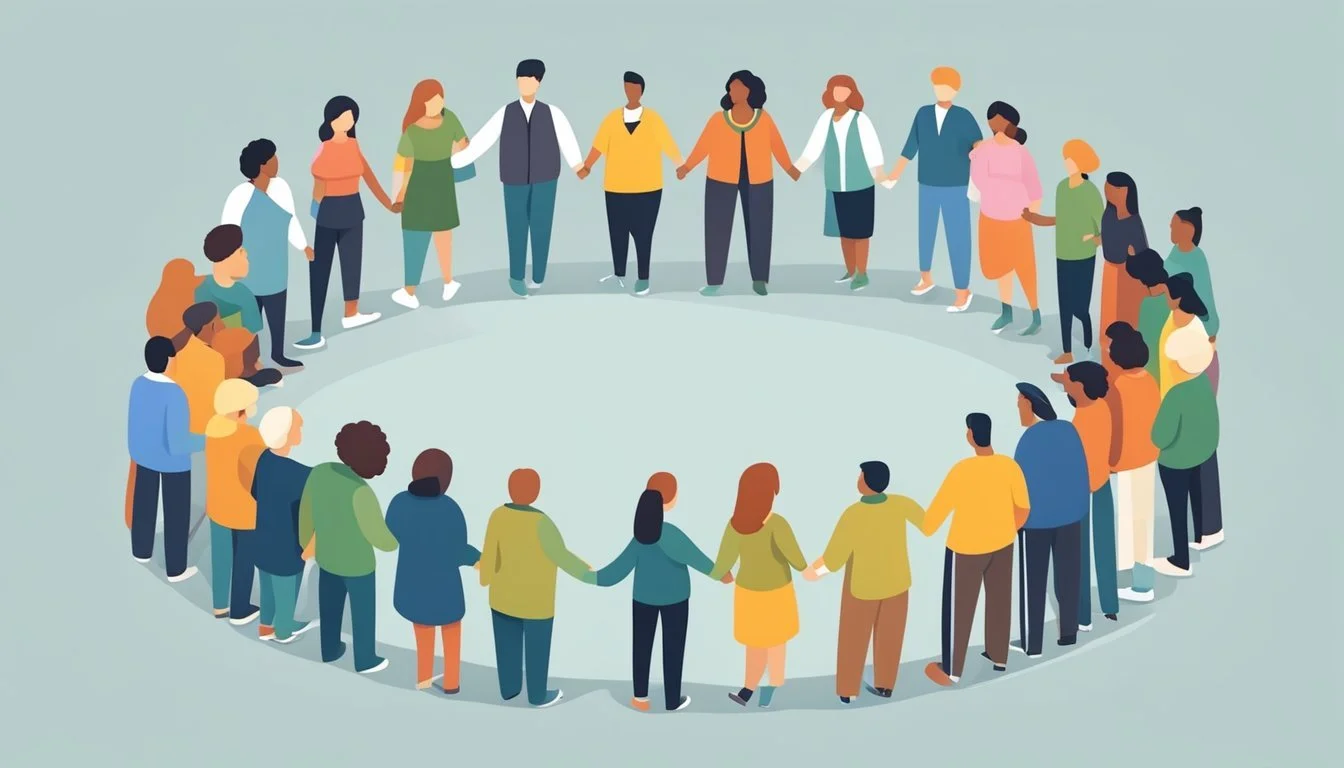19 Reasons Why Your Friends Are Your Chosen Family
The Bonds That Matter Most
In today's interconnected world, the concept of family extends far beyond biological or legal ties. Many individuals find that their closest confidants are those they have chosen to be part of their lives, creating a supportive network of friends who understand, uplift, and celebrate them.
These chosen families provide the emotional support and unconditional love often sought from traditional family structures. As society evolves, so too does our understanding of what it means to belong and be cared for, making chosen families an essential part of many people's lives.
1) They Understand Your Quirks
Friends who become your chosen family appreciate you for who you are. They acknowledge and accept your unique traits and habits without judgment.
These friends know your quirks, whether it's speaking like a favorite character or your particular way of organizing things. They make you feel comfortable being yourself.
By understanding these quirks, chosen family members celebrate what makes you unique. They support your individuality and make you feel valued.
Such acceptance helps build a strong bond, fostering a sense of belonging and emotional safety. This kind of understanding is not easily found but is deeply cherished when present.
Shared experiences and mutual acceptance strengthen these relationships. Friends who accept your quirks are a testament to true, unconditional support.
2) Always There in Tough Times
True friends are those who stand by you during the most challenging moments in life. They provide unwavering support when times get tough, demonstrating their loyalty and dependability.
During personal crises or hardships, these friends offer a listening ear and a comforting presence. Their support can be invaluable, helping you navigate through difficult periods.
Friends who are always there in tough times can share your burdens and help alleviate stress. They may not always have the solutions, but their presence alone can make a significant difference.
These friends are distinguished by their consistent and genuine care. Whether you are facing a financial dilemma, health scare, or emotional turmoil, their reliability shines through.
In moments of distress, having such friends reassures you that you are not alone. These friendships are built on trust, empathy, and mutual respect, qualities that are evident especially during adversities.
Knowing that someone is willing to stand by you through thick and thin cements the bond, turning friends into a chosen family. This kind of steadfast support is a hallmark of true friendship.
3) Celebrate Your Success
A key aspect of friendship is celebrating successes together. Friends act as your cheerleaders, motivating and lifting you when you reach milestones. Recognizing each other's achievements can reinforce bonds and build mutual respect.
Organizing small celebrations together can include simple activities. Hosting a dinner party with loved ones allows for a collective appreciation. A dinner party is a cozy way to acknowledge success.
Alternatively, outdoor activities like walking or jogging in the park offer a healthful and scenic way to celebrate. Physical activities such as these promote well-being while providing an opportunity to share joyous moments.
Sometimes, celebrating can be as simple as a heartfelt conversation. Expressions of pride and joy can have a profound impact. Acknowledging success encourages a culture of positivity and support within your friend group.
In some cases, more indulgent activities like a massage or spa treatment might be appropriate. Treating oneself and a friend to a spa treatment can be a luxurious way to relax and celebrate achievements together.
Dancing to your favorite song or taking a walk outside can elevate your mood and instill confidence. Activities such as these not only celebrate success but also promote confidence. These affirmations can strengthen friendships and improve overall well-being.
4) Unconditional Support
Friends often step in with unconditional support during difficult times. Unlike family, their lives might not be immediately impacted by your struggles, allowing them to offer unbiased and genuine assistance when needed.
This support can include emotional encouragement, helping you navigate challenges without the weight of familial obligations. Friendships can foster an environment where one feels safe to express vulnerabilities.
Moreover, friends provide unique perspectives and advice. This diverse input can be incredibly valuable, particularly when it comes from those who know you well and have your best interests at heart.
Even in everyday situations, the consistent presence of friends as a support system enhances emotional well-being. Their unconditional support helps create a stable foundation for personal growth and resilience. Friends are there to uplift and motivate, reinforcing a sense of belonging and trust.
For some, friends can become the primary support system, especially in the absence of close family ties. This chosen family relationship is often built on mutual respect, compassion, and love, forming a bond that transcends traditional family dynamics.
5) Share Common Interests
Friends often share common interests, which forms a strong bond. They enjoy the same hobbies, such as playing sports, watching movies, or cooking. These shared activities provide a basis for spending quality time together.
They may also appreciate similar genres of music, literature, or types of food. This common ground becomes a source of joy and connection. When friends engage in these interests together, they create lasting memories.
Having common interests can also lead to joint adventures and learning experiences. Whether it's traveling to new places or trying out a new hobby, these shared experiences strengthen their bond. This mutual enjoyment fosters a sense of camaraderie and understanding.
Engaging in common interests also means that friends can support each other's passions. They can encourage and motivate each other in their pursuits, creating a supportive environment. This mutual support further solidifies their relationship.
6) Trustworthy Confidants
Friends that form your chosen family are often trustworthy confidants. They offer a safe space where you can share your deepest thoughts without fear of judgment. This mutual trust builds a strong foundation for long-lasting relationships.
Unlike superficial acquaintances, chosen family members are genuinely invested in your well-being. They listen attentively and offer honest advice rooted in care and understanding. This creates a supportive environment where you feel heard and valued.
The importance of having reliable confidants cannot be overstated. Research shows that such relationships improve mental health by reducing stress and increasing feelings of security. When life gets challenging, knowing you have trustworthy friends to support you makes a significant difference.
Chosen family members often share personal experiences and vulnerabilities, further solidifying your bond. This reciprocal sharing of trust and honesty strengthens the connection between you. As a result, you build a reliable network of support that feels both comforting and empowering.
Ultimately, the trust you place in these confidants fosters a deeper sense of belonging. This connection goes beyond mere friendship, transforming into an invaluable support system. You can count on these friends to be there for you through life's ups and downs, making them essential members of your chosen family.
Find out more about how to build your own chosen family from Healthline.
7) Share Inside Jokes
Sharing inside jokes with friends solidifies bonds through shared experiences and humor. These jokes, rooted in specific events or observations, create a private language that instantly lights up the room.
Inside jokes act as a bridge, connecting friends through laughter and memories. They often stem from memorable moments or unique quirks that only the group understands.
These shared laughs provide comfort and a sense of belonging. When friends recall these jokes, they relive those happy moments, strengthening their connection.
Inside jokes are essential in friendships. They serve as tokens of affection and reminders of shared history. This private form of communication fosters a unique sense of unity and joy among close friends.
8) Encourage Personal Growth
Friends in a chosen family support each other in their personal development. This encouragement can include recommending books, sharing motivational content, or simply being a sounding board for ideas.
Sometimes, growth means stepping out of comfort zones. A friend might suggest tackling a new hobby or pushing career boundaries.
Open conversations about goals are essential. When a friend discusses their aspirations, this mutual understanding strengthens the bond.
Providing honest feedback is crucial too. Constructive criticism should be balanced with encouragement to foster growth.
Moreover, celebrating milestones, both big and small, reinforces the journey. Recognizing achievements makes the process more rewarding for everyone involved.
Listening to each other’s challenges and offering solutions can lead to growth. This collaborative approach enhances personal and collective progress.
Encouraging personal growth doesn't always mean grand gestures. Simple acts like expressing belief in a friend's abilities can have a profound impact.
9) Shared Memories
Shared memories play a vital role in the bond between friends who become chosen family. These memories often begin with simple, everyday moments that grow into cherished stories.
Friends create shared experiences through various activities, such as traveling together, attending events, or just spending time at home. These experiences strengthen their connection.
These shared moments often become the foundation for inside jokes and mutual understanding. They help friends navigate future challenges with a sense of familiarity and trust.
Reflecting on past memories can provide comfort and joy. Recalling the good times spent together reinforces the emotional ties and loyalty between friends.
These shared memories also create a sense of continuity and history. They act as a collective narrative that ties friends closer together, even when they are physically apart.
10) Non-Judgmental
Friends often provide a sense of understanding without judgment. Unlike some family members who may have preconceived expectations, friends accept each other as they are. This creates a safe space to be genuine and open.
Non-judgmental friendships allow individuals to share their thoughts and feelings freely. This acceptance fosters deeper connections and strengthens the bond between friends.
Friends who refrain from judging can help one discover their true self. This encourages personal growth and self-awareness by providing a supportive and accepting environment.
Lack of judgment from friends reduces stress. Knowing that one's actions or thoughts won't be critiqued promotes mental well-being and open communication.
Friends who are non-judgmental are pillars of support during tough times. Their acceptance and understanding can be a source of comfort and relief.
11) Emotional Support
Friends often provide the emotional comfort we need during tough times. They listen without judgment, offering a sense of security. This support is crucial for mental well-being.
Chosen family members understand your emotional needs deeply. This bond allows them to offer more personalized support. They can recognize when you need encouragement, a shoulder to cry on, or simply someone to share joy with.
Unlike biological family, chosen family is formed through mutual affection and respect. This voluntary connection often leads to more meaningful and intentional emotional support. Friends-turned-family are there because they choose to be, which adds a layer of trust and reliability.
In times of crisis, this emotional support can be more effective. Friends often understand unspoken cues and can provide comfort without the need for words. They help you navigate emotional turmoil and celebrate your successes with genuine happiness.
Kryss Shane, an LGBTQ+ expert, emphasizes the importance of cultivating these relationships for emotional stability. Identifying individuals with similar interests and values is key to building a chosen family that supports your emotional well-being in meaningful ways.
Studies have shown that strong social ties can improve mental health. A support system built on friendship enriches life and provides a crucial buffer against stress. This emotional support network helps individuals feel valued and understood.
Having a chosen family means always having someone to turn to, no matter the situation. This emotional backbone is essential for a balanced and fulfilling life.
12) Positive Influence
A positive influence plays an integral role in the dynamics of a chosen family. Someone who is a positive influence can communicate openly about thoughts and feelings. Their ability to listen actively and validate different views fosters a trusting environment.
Such individuals often encourage others to pursue their goals and offer constructive support. They can provide motivation and inspiration, helping others to see the brighter side of challenging situations.
The influence extends to promoting healthy habits and well-being. Whether it's suggesting a healthier lifestyle or encouraging mindfulness, their impact can lead to significant improvements in mental and physical health.
They also help in conflict resolution by maintaining a calm demeanor and promoting empathy. Their balanced approach can guide others to find peaceful solutions.
For more details on being a positive influence, visit Hack Spirit.
13) Offer Honest Advice
Friends can always be counted on to provide sincere feedback. They don't just tell you what you want to hear, but rather what you need to hear.
A genuine friend will sit you down and share their thoughts candidly. This honesty is deeply rooted in their care for your well-being.
When you make mistakes, they'll be the ones to point them out. This ensures personal growth and helps you avoid potential pitfalls in the future.
This kind of candid advice encourages self-reflection. By valuing their input, you're more likely to make informed decisions and improve yourself.
It is the trust between friends that allows such open exchanges. This trust builds a solid foundation for a deep and meaningful relationship.
For more insights on how friends help you discover who you are, you can explore this article.
14) Help in Crisis
Friends often serve as a critical support network during times of crisis. Unlike traditional family members, friends can offer a fresh perspective on challenging situations.
Friends can act as a safe space for venting emotions and sharing concerns. The absence of familial expectations often makes communication easier and more honest.
Emotional support from friends can significantly alleviate stress. Their presence can provide comfort in ways that may not always be available through biological family members.
Practical help from friends is invaluable in crisis situations. They may assist with tasks ranging from daily chores to providing a place to stay temporarily.
In addition, friends often possess diverse skills and knowledge. This range of expertise can be crucial for navigating specific challenges effectively.
Strong bonds with friends can create an enduring support network that helps individuals face even the most demanding situations.
The acceptance and understanding provided by friends are vital during tough times. They offer non-judgmental listening and empathy, which can be crucial for emotional healing.
A chosen family is not bound by obligation but by genuine concern and desire to help. This makes their support both heartfelt and effective. For more information on the importance of chosen families, visit Psychology Today.
15) Keep You Grounded
Friends provide balance in life. When tensions run high, a friend can offer a calming presence. They remind you of what is important.
They also offer honest feedback. True friends don’t shy away from tough conversations. They help you see situations from a different perspective.
In moments of overexcitement, they can temper your enthusiasm with realism. This keeps you focused on achievable goals.
Friends also help counteract emotional highs and lows. Knowing someone is there to share both triumphs and failures makes these experiences more manageable. They keep your life in perspective.
A support system of friends can act as a reality check. They bring you back to earth when you might be getting ahead of yourself. Relying on their wisdom and advice is valuable.
Friends act as informal mentors, guiding you through complex life decisions. Their experience and insights help you navigate challenges. Clear, thoughtful advice from a trusted friend is often all you need.
Having friends who keep you grounded ensures you remain clear-headed. They play a crucial role in maintaining emotional stability and personal well-being. Such friendships are invaluable, offering support in both straightforward and complicated times.
16) Provide Different Perspectives
Friends often come from various backgrounds and life experiences. This diversity allows them to offer unique viewpoints that one might not get from family members. These different perspectives can be invaluable in making well-rounded decisions and gaining new insights.
Friends might introduce each other to new ideas, cultures, and ways of thinking. They can provide fresh takes on common problems, often seeing solutions that family members might overlook. By being exposed to these varying views, individuals can grow and adapt more effectively.
When faced with personal dilemmas, a friend’s perspective can shed light on aspects that were previously unseen. This ability to see things differently helps in understanding situations from multiple angles, fostering empathy and broadening one's outlook.
Friends also challenge each other’s beliefs and assumptions. This can lead to personal growth and a deeper understanding of oneself. By questioning and debating, friends help each other refine their thoughts and develop more nuanced opinions.
In times of conflict, having friends with different perspectives can help mediate and resolve issues. They can offer unbiased advice and act as a sounding board, which is crucial for navigating complex interpersonal dynamics.
17) Enhance Your Social Life
Friendships play a critical role in enhancing one’s social life. Regular interactions with friends can boost social skills and create opportunities to meet new people. They can introduce you to their circles, widening your network.
Engaging in activities together, such as joining clubs or attending events, can enrich these experiences. Social gatherings with friends enable shared experiences, making your social life more vibrant and fulfilling.
Frequent socialization has been linked to better mental and physical health. Spending time with friends can reduce stress and increase feelings of happiness and belonging.
Shared interests and consistent meet-ups foster deeper connections, making social interactions more enjoyable. Friends act as a support system, encouraging an active social life and reducing feelings of loneliness. They bring variety and excitement into daily routines.
In essence, friends greatly contribute to a lively and engaging social life, benefitting overall well-being.
18) Foster a Sense of Belonging
Belonging is an essential human need, just like food or shelter. When people feel like they are truly part of a group, they experience higher levels of happiness and fulfillment. Being part of a trusted circle makes individuals feel seen and understood.
Friends can offer a unique space where everyone feels accepted. This acceptance builds an environment where people can be their genuine selves. Shared experiences and mutual support reinforce the connections within this group.
Spending time together and engaging in meaningful conversations can deepen these bonds. Listening actively and showing empathy enhances trust and understanding. This creates a sense of security, strengthening the feeling of belonging.
Performing small acts of kindness, such as celebrating milestones and offering support during tough times, also solidifies these connections. These actions demonstrate care and commitment, key elements in fostering an inclusive group.
Being part of a group encourages individuals to grow personally and emotionally. They adopt positive behaviors and attitudes from their peers. As they strive to be better friends, they also improve their overall well-being.
For more insights on the importance of belonging and ways to strengthen it, you can read about how we can increase our sense of belonging through our connection with others and with nature.
19) Help Overcome Hardships
Friends often play a crucial role in helping us navigate difficult times. Their support can be invaluable when facing challenges. They listen without judgment and offer practical advice.
During hardships, friends can serve as a source of emotional stability. They provide encouragement and motivate us to keep going.
True friends help by being present. They can assist with daily tasks, making life more manageable. They step in where family might not be able to, offering a different perspective.
Friendship can be especially important when dealing with broken promises and unmet expectations from others. It's common to experience hurt from friends, but addressing these friendship problems can strengthen relationships.
Moreover, friends can help discover personal strengths. They encourage us to explore our interests and support our personal growth. This helps us navigate and overcome various obstacles in life.
Open communication with friends allows us to express our feelings and concerns. This helps in reducing stress and anxiety, making it easier to tackle hardships.
By leaning on friends, individuals can find the strength and resilience needed to face life's difficulties. This supportive network can be a vital component of one's emotional well-being.
The Emotional Support of Friendships
Friendships provide invaluable emotional support through shared experiences and a non-judgmental companionship that helps individuals navigate life's challenges. These bonds foster an understanding environment that is crucial for mental well-being.
Shared Experiences and Understanding
Friends often go through similar life events, making them uniquely positioned to empathize with each other. This shared history can include everything from growing up together to navigating adult milestones. Having someone who has experienced similar struggles and triumphs offers a sense of solidarity and validation.
People benefit from talking to friends who have gone through the same things because it creates a sense of belonging. It can be comforting to know that someone understands your unique situation. This goes a long way in alleviating feelings of isolation.
Moreover, friends can provide insights and perspectives that you might not have considered. This can be particularly helpful in problem-solving and making difficult decisions. Their advice often comes from a place of genuine understanding and experience, which can be more impactful than external, less personalized advice.
Non-Judgmental Companionship
One of the most important aspects of friendship is the ability to offer a non-judgmental space. Friends listen without immediate criticism or bias, providing a safe space to express one's true feelings and thoughts. This type of companionship enables individuals to be more open and honest, which is essential for emotional health.
Non-judgmental support helps in building self-esteem and confidence. When people feel accepted for who they are, they are more likely to open up and discuss their feelings. This encourages emotional growth and resilience.
Friends offer a unique blend of emotional support by being there through thick and thin, without judgment. This creates a strong foundation of trust and mutual respect, making it easier to face personal and external challenges. The emotional stability garnered from such friendships is instrumental in maintaining good mental health.
Building Trust and Reliability
Establishing trust and ensuring reliability in friendships are crucial components that solidify these relationships. Key aspects include providing consistent encouragement and unwavering loyalty.
Dependable Encouragement
When friends offer dependable encouragement, it strengthens trust. Regular support, whether emotional or practical, reassures individuals that they can rely on their friends.
This consistent backing helps both parties feel secure in the relationship. Encouragement can take many forms, such as being present during challenging times or celebrating achievements together.
Friends who consistently uplift each other create a foundation of trust. This foundation makes it easier to navigate life's ups and downs, knowing there is always someone reliable to lean on.
Loyalty Through Thick and Thin
Loyalty is another cornerstone of building trust. True friends remain steadfast, regardless of circumstances. This unwavering support fosters a deep sense of reliability.
Loyalty involves standing by friends during both good and bad times. It means being there even when situations are tough or when there are disagreements.
Such loyalty assures friends that their bonds are strong enough to endure challenges, further cementing the trust and reliability within the relationship. Loyalty nurtures a sense of security and stability, crucial for any chosen family.













